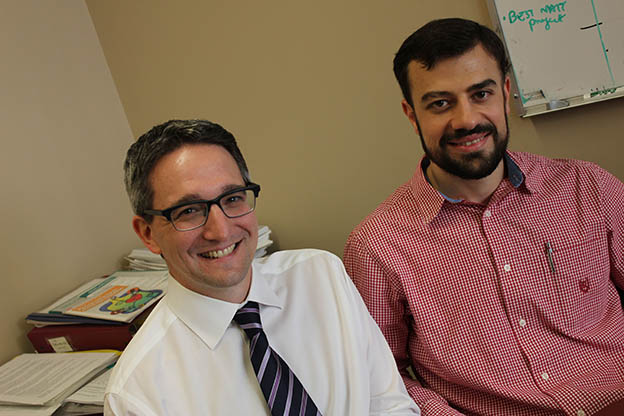Secrets to publishing success for residents

Donald Arnold, associate professor of Medicine, and cardiology resident Aiman Alak. Alak says he has pinpointed the factors that can help residents start and finish research projects.
Aiman Alak knows the elation of having research published and the impact it can have on the success of a career.
The former internal medicine resident, now a cardiology resident in the Department of Medicine, recently published his paper, How to Succeed in Research During Medical Training, in the journal Clinical Investigative Medicine. The study was funded by the Regional Medical Associates Research Scholarship Fund.
“Having a research background is important to your career, and for fellowship applications it’s a major bonus,” he says. “Unfortunately, 90 to 95 percent of resident research gets close to being finished but it’s just that one last step of publishing the paper—and probably getting the most benefit and credit for the work—that gets dropped by the wayside.”
Alak and the research team decided to pursue this project to pinpoint the factors that can help residents start and finish research projects. Their findings were divided into three main categories:
- Residents have to be the main driver of the project and they have to be motivated, involved and push the research along. They must use any resources available to finish their project.
- The supervisor must navigate the project to completion. Supervisors can be involved in choosing interesting topics that are limited in scope, can be managed and completed in a short period of time, and are publishable.
- And finally, time is a major issue. A few strategies were identified to deal with the problem: choose the right topic, plan and protect research time, and build a research team of multiple residents and supervisors who can complement each other.
“Supervisors shouldn’t be shy,” says Alak. “Part of their role is to set deadlines, and if those deadlines aren’t met, residents should be reminded – we found that most residents appreciated that little bit of pushing along. It shows that that the supervisor is interested and sees the project as a worthy time commitment.”
Donald Arnold, associate professor of Medicine, was Alak’s faculty supervisor and is the research director for the internal medicine residency training program at McMaster.
The huge challenge says Arnold, is that residents already have a full-time job conducting their clinical work, and on top of that they are expected to manage a research project. Still, learning the skills involved in research is important at this early stage and it may spark an interest in a future academic career for some trainees.
“Managing a full-time job plus a research project is very challenging for residents and supervisors are aware of that, but there isn’t a lot of formal teaching or guidance around how we manage that type of scenario,” he says.
Part of the motivation behind doing this project was also to provide some sort of framework for supervisors, adds Arnold. And it was quite unique because it was done from both perspectives independently, interviewing residents and supervisors and getting their views on what makes for a successful research project.
“Sometimes opinions were very convergent and sometimes they were divergent, but at the end of the day, supervisors and residents came up with the same three main conclusions,” says Arnold.
“Residents are the motivator, the supervisor has to keep focus in check, and no one has any time but we have to figure out a way to manage that. Our challenge now is how to get this out to supervising faculty. Maybe give them some reassurance that it’s not innate, you are not born knowing how to do this and here is a bit of framework that can help you succeed.”
